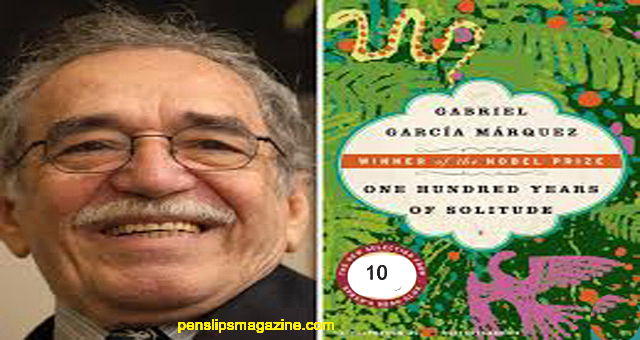
One Hundred Years of Solitude … Garcia Marquez
GABRIEL GARCIA MARQUEZ was born in Aracataca, Colombia in 1928, but he lived most of his life in Mexico and Europe. He attended the University of Bogota and later worked as staff reporter and film critic for the Colombian newspaper El Espectador. In addition to ONE HUNDRED YEARS OF SOLITUDE, he has also written two collections of short fiction, NO ONE WRITES TO THE COLONEL and LEAF STORM. Penslips Magazine intends to present this novel regularly.
ONE HUNDRED YEARS OF SOLITUDE
TRANSLATED FROM THE SPANISH
BY GREGORY RABASSA
ONE HUNDRED YEARS OF SOLITUDE
CHARACTERS
Jort Areadio BoendUi
m. Cnula Iguarln , olonel Aurellano Btiendia-,
-Jos6 Areadio
m-Rebeca , m. Remcdios Moscote. Remcdios Moscote , Aurcliano
TEN
Chapter 2
“It’s all right, Prudencio,” he told him. “We’re going to leave this town, just as far away as we
can go, and we’ll never come back. Go in peace now.”
That was how they undertook the crossing of the mountains. Several friends of Jose Arcadio
Buendia, young men like him, excited, by the adventure, dismantled their houses and packed up,
along with their wives and children, to head toward the land that no one had promised them. Before
he left, Jose Arcadio Buendia buried the spear in the courtyard and, one after the other, he cut the
throats of his magnificent fighting cocks, trusting that in that way he could give some measure of
peace to Pmdencio Aguilar. All that Ursula took along were a trunk with her bridal clothes, a few
household utensils, and the small chest with the gold pieces that she had inherited from her father.
They did not lay out any definite itinerary. They simply tried to go in a direction opposite to the road
to Riohacha so that they would not leave any trace or meet any people they knew. It was an absurd
journey. After fourteen months, her stomach corrupted by monkey meat and snake stew, Ursula
gave birth to a son who had all of his features human. She had traveled half of the trip in a
hammock that two men carried on their shoulders, because swelling had disfigured her legs and her
varicose veins had puffed up like bubbles. Although it was pitiful to see them with their sunken
stomachs and languid eyes, the children survived the journey better than their parents, and most of
the time it was fun for them. One morning, after almost two years of crossing, they became the first
mortals to see the western slopes of the mountain range. From the cloudy summit they saw the
immense aquatic expanse of the great swamp as it spread out toward the other side of the world. But
they never found the sea. One night, after several months of lost wandering through the swamps, far
away now from the last Indians they had met on their way, they camped on the banks of a stony
river whose waters were like a torrent of frozen glass. Years later, during the second civil war,
Colonel Aureliano Buendia tried to follow that same route in order to take Riohacha by surprise and
after six days of traveling he understood that it was madness. Nevertheless, the night on which they
camped beside the river, his father’s host had the look of shipwrecked people with no escape, but
their number had grown during the crossing and they were all prepared (and they succeeded) to die
of old age. Jose Arcadio Buendia dreamed that night that right there a noisy city with houses having
mirror wails rose up. He asked what city it was and they answered him with a name that he had
never heard, that had no meaning at all, but that had a supernatural echo in his dream: Macondo. On
the following day he convinced his men that they would never find the sea. He ordered them to cut
down the trees to make a clearing beside the river, at the coolest spot on the bank, and there they
founded the village.
Jose Arcadio Buendia did not succeed in deciphering the dream of houses with mirror walls until
the day he discovered ice. Then he thought he understood its deep meaning. He thought that in the
near future they would be able to manufacture blocks of ice on a large scale from such a common
material as water and with them build the new houses of the village. Macondo would no longer be a
burning place, where the hinges and door knockers twisted with the heat, but would be changed into
a wintry city. If he did not persevere in his attempts to build an ice factory, it was because at that
time he was absolutely enthusiastic over the education of his sons, especially that of Aureliano, who
from the first had revealed a strange intuition for alchemy. The laboratory had been dusted off.
Reviewing Melquiades’ notes, serene now, without the exaltation of novelty, in prolonged and
patient sessions they tried to separate Ursula’s gold from the debris that was stuck to the bottom of
the pot. Young Jose Arcadio scarcely took part in the process. While his father was involved body
and soul with his water pipe, the willful first-born, who had always been too big for his age, had
become a monumental adolescent. His voice had changed. An incipient fuzz appeared on his upper
lip. One night, as Ursula went into the room where he was undressing to go to bed, she felt a
mingled sense of shame and pity: he was the first man that she had seen naked after her husband.